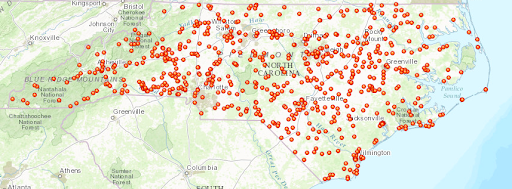
Recycling centers are classified installations for the protection of the environment. They are open to residents of the community so that they can deposit household and similar waste that they do not are not allowed to present for household waste collection.
The establishment of a network of recycling centers and landfills in North Carolina completes the collection system to develop recycling mechanisms as much as possible and recovery of household waste and avoid wild deposits, in accordance with the local regulations.
The users are residents and professionals. Users must strictly comply with the instructions and sorting instructions, given on site by the agents who are trained for this purpose. It should also be noted that users must unload their waste themselves. In no case the staff has to carry out loadings or unloads.
Recycling centers access
Access to recycling centers is reserved and free for residents residing in the territory of one of the municipalities of NC. In the event of a dispute, the user must present proof of address. Access is paying for private companies, administrations, non-resident services in the territory, subject to prior registration and compliance with quantities to deposit and tariffs applied.
Access is limited to the following vehicle categories: light vehicles with or without a trailer, vehicles with a maximum total weight of 3.5 T and a height less than 2 m. Waste management companies can drop Wilmington dumpsters and roll-offs from other NC citie.
Vehicles with a maximum P.T. of 3.5 t and a height of less than 2m does not apply to collectors responsible for removing waste on the upper track in recycling centers on behalf of the Community.
The quantities admitted cannot exceed the admissible production for a household, i.e. 2m3 per day with all products combined.
Types of waste
Authorized waste are miscellaneous household bulky items, wood, scrap metal, household oils (private individuals only), plastic films, clothing and shoes, toys, empty and clean metal or plastic drums, motorized cultivators and tools (emptied of their oil), polystyrene, mopeds or bikes, cuttings and rubble, mowing of lawn, pruning products or garden branches (except stumps), papers, cartons, newspapers, books, materials IT (individuals only), hi-fi and video, clean plaster, household appliances (private individual only).
Waste authorized under conditions include Special Household Waste, accepted up to the limit of 10 liters per daily intake. The deposit of Special Household Waste must be made by users in the area reserved for this purpose and under the control of the reception staff.
They include: car batteries, bases, cosmetics, neon lights, fluorescent tubes, lamps, phytosanitary, drugs, paints, aerosol cans, glues, batteries (cadmium, nickel, alkalines, buttons, etc.), varnishes, mercury and derivatives, photo products, oils, solvents, radiography, fire extinguishers, gas cylinders , acids. Tires brought by individuals are accepted within the limit of 4 light vehicle tires (truck tires and agricultural vehicles prohibited). A control of admitted waste may be carried out within the recycling center by staff.
Prohibited waste are household waste, explosive, flammable products or liquid, radioactive fuels (in particular hunting cartridges, bullets and rockets). To be returned to the police, the entire elements of the car bodyor truck, household oils except individuals, waste anatomical or infectious, the fat from the grease traps, agricultural tarpaulins, dead animals, flocking and asbestos slabs. This list is not exhaustive, the keeper of the recycling center is authorized to refuse waste which, by its nature, their forms, their dimensions, volumes or quantities, would present a danger or specific constraints for exploitation.
Recycling center regulations
Reception staff will advise and guide users to dumping and treatment sites waste not accepted on recycling centers. In the event of unloading of materials not admitted, the costs of recovery and transport will be the responsibility of the offending user, who can be seen, in the event of a recurrence and after putting into operation remains, refuse access to recycling centers, without prejudice damages which may be due to the Community
Circulation within the recycling centers must be done in strict compliance with the highway code, and signage put in place. The speed is limited to 15km / hour maximum. Parking of vehicles for recycling center users is only authorized on quays for the duration of waste dumping operations in skips and containers. Users must leave this platform as soon as the unloading is completed in order to avoid any congestion on the platform.
The deposited waste is the exclusive property of the operator. Access to recycling centers is prohibited for anyone who does not bring waste. Access to the interior of skips or boxes is strictly prohibited to any person. The recovery of materials is prohibited to any person apart from the provisions made by the local government for the recovery of waste.
The user is civilly liable for the damage he causes goods and people in the recycling center. Users must comply with these regulations and instructions given by operating personnel regarding traffic and safety rules. The center declines any responsibility in case of accident resulting from non-compliance with the instructions. Vehicle maneuvers and operations unloading is done at the users’ own risk.
For safety reasons, it is forbidden to smoke on the whole site or to bring any heat source in the area. The center declines all responsibility in the event of non-compliance with these safety instructions. Any user, contravening these regulations, will be prosecuted if necessary, in accordance with the laws and regulations in force. More generally, users offenders may be denied access to recycling centers, temporarily or permanently.